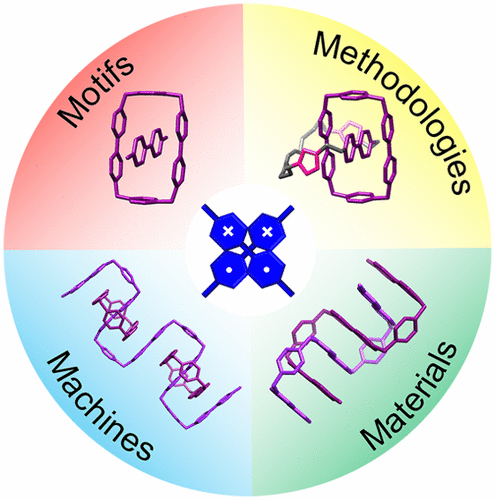当前位置:
X-MOL 学术
›
ACS Cent. Sci.
›
论文详情
Our official English website, www.x-mol.net, welcomes your
feedback! (Note: you will need to create a separate account there.)
Introducing Stable Radicals into Molecular Machines
ACS Central Science ( IF 12.7 ) Pub Date : 2017-08-14 00:00:00 , DOI: 10.1021/acscentsci.7b00219 Yuping Wang 1 , Marco Frasconi 2 , J. Fraser Stoddart 1
ACS Central Science ( IF 12.7 ) Pub Date : 2017-08-14 00:00:00 , DOI: 10.1021/acscentsci.7b00219 Yuping Wang 1 , Marco Frasconi 2 , J. Fraser Stoddart 1
Affiliation

|
Ever since their discovery, stable organic radicals have received considerable attention from chemists because of their unique optical, electronic, and magnetic properties. Currently, one of the most appealing challenges for the chemical community is to develop sophisticated artificial molecular machines that can do work by consuming external energy, after the manner of motor proteins. In this context, radical-pairing interactions are important in addressing the challenge: they not only provide supramolecular assistance in the synthesis of molecular machines but also open the door to developing multifunctional systems relying on the various properties of the radical species. In this Outlook, by taking the radical cationic state of 1,1′-dialkyl-4,4′-bipyridinium (BIPY•+) as an example, we highlight our research on the art and science of introducing radical-pairing interactions into functional systems, from prototypical molecular switches to complex molecular machines, followed by a discussion of the (i) limitations of the current systems and (ii) future research directions for designing BIPY•+-based molecular machines with useful functions.
中文翻译:

将稳定的自由基引入分子机器
自发现以来,稳定的有机基团因其独特的光学,电子和磁性特性而受到化学家的广泛关注。当前,化学界最有吸引力的挑战之一是开发先进的人工分子机器,该机器可以通过消耗运动蛋白的方式来消耗外部能量,从而发挥作用。在这种情况下,自由基配对相互作用对解决这一挑战很重要:它们不仅在分子机器的合成中提供了超分子辅助,而且为开发依赖于自由基种类的各种功能的多功能系统打开了大门。在此展望中,通过采用1,1'-二烷基-4,4'-联吡啶鎓(BIPY •+)作为示例,我们重点介绍了将自由基配对相互作用引入功能系统(从典型的分子开关到复杂的分子机器)的艺术和科学方面的研究,然后讨论了(i)当前系统的局限性和(ii ),以设计具有有用功能的基于BIPY +的分子机器的未来研究方向。
更新日期:2017-08-14
中文翻译:

将稳定的自由基引入分子机器
自发现以来,稳定的有机基团因其独特的光学,电子和磁性特性而受到化学家的广泛关注。当前,化学界最有吸引力的挑战之一是开发先进的人工分子机器,该机器可以通过消耗运动蛋白的方式来消耗外部能量,从而发挥作用。在这种情况下,自由基配对相互作用对解决这一挑战很重要:它们不仅在分子机器的合成中提供了超分子辅助,而且为开发依赖于自由基种类的各种功能的多功能系统打开了大门。在此展望中,通过采用1,1'-二烷基-4,4'-联吡啶鎓(BIPY •+)作为示例,我们重点介绍了将自由基配对相互作用引入功能系统(从典型的分子开关到复杂的分子机器)的艺术和科学方面的研究,然后讨论了(i)当前系统的局限性和(ii ),以设计具有有用功能的基于BIPY +的分子机器的未来研究方向。









































 京公网安备 11010802027423号
京公网安备 11010802027423号